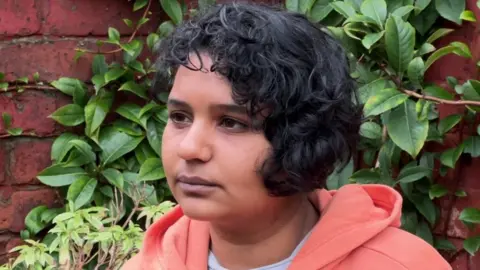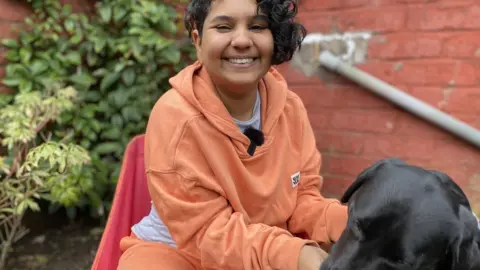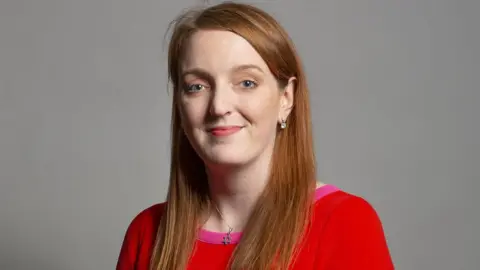ADHD medication shortage: 'I'm white knuckling everyday life'
 BBC
BBC"Taking medication meant my brain was quiet for the first time; it was amazing, I cried because I was so happy," Jass Thethi, whose life was transformed after an ADHD diagnosis just over a year ago, told a BBC North West investigation.
But the 34-year-old's joy was short-lived because, like more than 150,000 others who live with the condition and are reliant on medication, Jass has been affected by a UK-wide medicine shortage that started in September.
Jass, who lives in Levenshulme, Greater Manchester, said: "When the medication shortage started I had to go back to white knuckling everyday life… I had to take the decision to change things and I had to quit the job I was doing."
The charity ADHD UK said it had recorded a "significant decline" in the availability of medicines, with only 11% having their normal prescription in January, a drop from 52% in September.
The Department of Health and Social Care (DHSC) said increased global demand and manufacturing issues were behind the shortages.
Former charity worker Jass has been without her prescription for six months and told the BBC it had exacerbated her fibromyalgia, a long-term condition that causes pain all over her body.
"Not having my ADHD meds means I can't sleep," she said. "That means my anxiety is worse and that means the pain gets worse and unfortunately there's not a lot that can be done as I'm at the top of what they can do for my pain.
"There's not a lot of options at the moment, so I had to take the decision to really change my life and quit the job I enjoyed."

Dr Morgan Toerien, associate specialist in mental health at Beyond Clinics in Warrington, said Jass's experience was not unique and many patients' lives had been "completely destabilised".
"You find some people whose lives have been really transformed on medication, in terms of confidence, relationships, self-esteem and you find they've been able to go back into work.
"It just completely destabilises people and they can literally fall apart if the medication is stopped abruptly."

What is attention deficit hyperactivity disorder? (ADHD)
- Attention deficit hyperactivity disorder is a condition that affects people's behaviour
- People with ADHD can seem restless, may have trouble concentrating and may act on impulse
- Most cases are diagnosed when children are under 12 years old but sometimes it is diagnosed later in childhood
- However, on other occasions ADHD was not recognised at all when someone was a child and they are diagnosed later, as an adult
Source: NHS England

Dr Toerien explained ADHD medication regulates brain function to help patients "switch on" and "switch off".
"Medication stimulates the nervous system, it penetrates deep into the nervous system where there is a switch, which allows the nervous system to engage and disengage.
"Often in people with ADHD when they're trying to relax, their mind is racing at a hundred miles an hour and then when they're trying to focus they get distracted and their thoughts are off in other places."
Dr Toerien said proper medication can have a "profound" impact, adding: "Some people find very small amounts of drugs make a significant impact, some have very profound changes and they find that all of a sudden, they are able to do tasks that they were never able to do before."
Jass told the BBC her medication made her feel "free" and "independent".
"Having ADHD is like having six different radio channels on in your brain at the same time and occasionally a couple of them might be in a different language," she said.
"They're all the same volume, you don't know where the off switches are and you don't know which one to listen to and which one to deal with first.
"Taking medication meant it was quiet for the first time ever. I cried when I took it because it was quiet in my brain, it was amazing, I was so happy."
She added: "I didn't know that's what normal people felt like, I was so confused for so much of my life. I was like how is everyone just getting on with it?"

ADHD UK estimated about 150,000 people were currently experiencing issues with their medication.
Survey results, published by the charity last month, found that 87% of members agreed that their work had been negatively impacted due to the shortage and 84% of full-time students said their learning had suffered.
Warrington MP Charlotte Nichols raised the issue at Prime Minister's Questions last month and said she was still being contacted by constituents about it.
"I've been getting more and more contact from people with increasingly desperate stories, people have bene rationing their medication, people have been having to ring lots of different pharmacies, and they have been having to make really huge round trips to get the medication they need," she said.
"It feels like if this is going to be three or four more months of disruption, there is more that could be being done to support people."
 UK Parliament
UK Parliament A Department of Health and Social Care spokesperson said: "We have taken swift action to improve the supply of ADHD medications, but we know some challenges remain and understand that this may be distressing to patients and families.
"We have well-established processes to prevent, manage and mitigate medicine shortages to ensure patients can continue to access the treatments they need.
"We are working closely with the NHS, industry and others operating in the supply chain to help resolve any issues with ADHD medication as soon as possible.
"We have also issued advice to healthcare professionals and any patient who is worried about their condition should speak to their clinician."

Why not follow BBC Manchester on Facebook, X and Instagram? You can also send story ideas to [email protected].
